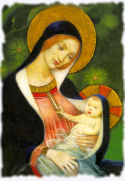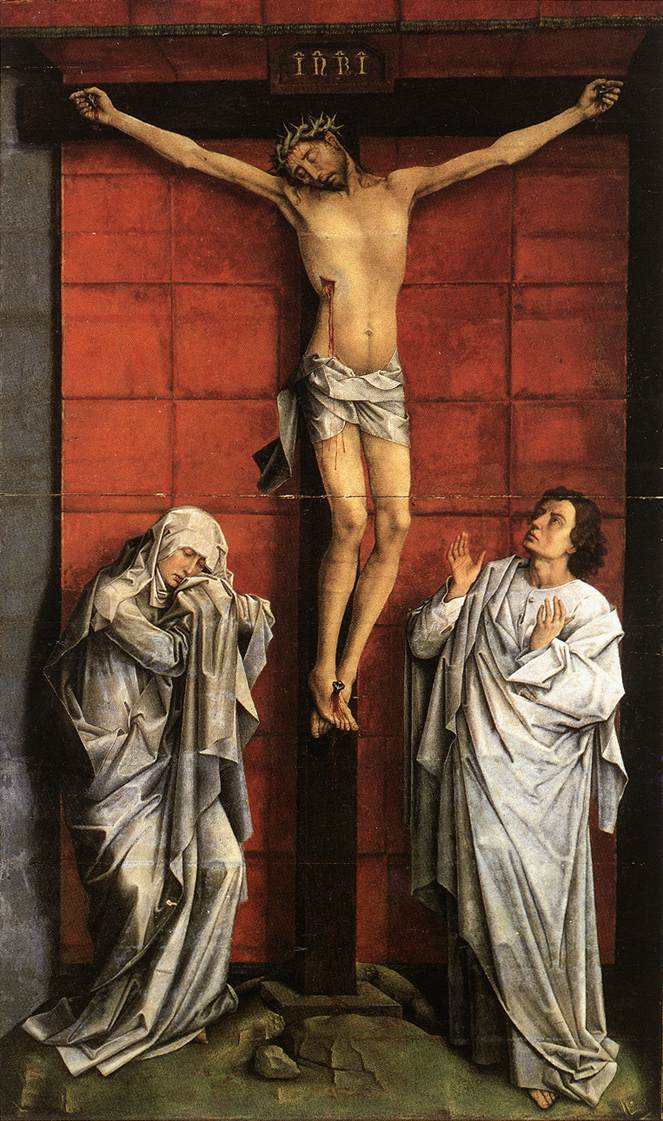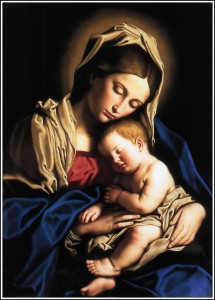The Lord bless you and keep you!
and be gracious to you!
The LORD look upon you kindly and
give you peace! (Nm 6: 24-26)
This January 1st, this first day of a new year, we continue to deepen our understanding of the Christmas mystery – God who has become for us the Word made flesh and bone among us. God came from his abode outside of time and space to our and his created world of touchable space and time. So we know that in this time and space, through the human birth of God made flesh, we now stand for ever in partnership with our creator.
This first day of the year we recognize the maternal vocation of Mary who is rightly titled the “Holy Mother of God.” Mary, Theotokos (the “bearer of God”) in Greek. Because Jesus was both divine and human, it is appropriate for us to call her the “mother” of God. Because Mary was of the lineage of King David, from her does Jesus receive his Jewish heritage. So, this Solemnity helps to explain the connection between God and humanity.
Not that we are co-creators but as creatures loved by our creator who has entrusted to us a certain amount of time here to come to know him and his will for us. So, maybe a good reflection as we begin this year is to ask ourselves about the best use of our time.
Time means little to young children but as we mature, we recognize the value and limitation of time and we cherish it more carefully. We find time for everything from vacation to work; business or pleasure or sometimes a combination of both. Hopefully, a portion of that time is spent in pursuit of a prayer relationship with God. To never do so, is indeed a waste of time.
Yet, we always have 365 days in a year, seven days in a week, twelve months in a year, and the same 24 hrs in every day – no more and no less. An hour is always 60 minutes and a minute is always 60 seconds. So, time actually never changes, it is always the same measurement. It just seems to move faster. Maybe scientists or psychologists have a theory about perception which becomes reality?
As we enter this new year of 2012, the Church calls us to mark time again by reflecting on Peace in the new year ahead. How much energy, or time, do I spend in doing good for others? In being a maker of peace rather than simply pursuing my own self-interest or personal priorities?
We don’t need to solve world hunger or devise the formula for peaceful relationships between nations or find the cure for cancer. As righteous as all of that is, I believe we are called to use our time in the ordinary pursuits of life caring for one another in feeding the hungry, giving drink to the thirsty, clothing the naked, etc.
The Motherhood of Mary reminds us of this great woman who put aside her personal agenda and embraced the divine will – “Let it be done to me as you say.” (Lk 1: 38). Such selfless choice brings a harmony with a greater will beyond my own and that produces peace.
The Gospel for this Sunday (Lk 2: 16-21) describes a peaceful scene between the shepherds, Mary and Joseph. The shepherds don’t waste any time. They run “in haste” to Bethlehem to look for the infant in the manger that was proclaimed to them by the choir of angels out in their fields that night. Seeing that child confirmed what they were told – that God had entered time and space and somehow they just knew it all to be true. No further explanation as necessary and they glorified God for what had been told them. How often do I recognize God before me and respond in faith? They were changed by what they saw and heard. No longer ordinary shepherds for sure!
Meanwhile, Mary “kept all these things, reflecting on them in her heart.” (Lk 2: 19). Mary herself was changed as she grew in a greater understanding of who her son might be and what his ultimate purpose was for.
Pope St. Leo the Great states: “In the very act in which we are reverencing the birth of our Savior, we are also celebrating our own new birth. For the birth of Christ is the origin of the Christian people; and the birthday of the head is also the birthday of the body.” (Sermon 6). Something to ponder in our own hearts indeed.
As the new year begins, how can I slow down my time in order to find more time for the practice of my faith? Do I see the Christ among us in the Eucharist and the assembly gathered each week? God’s blessing to one and all as we turn that calendar not just to a new month but to this new year.
O God, who through the fruitful virginity of Blessed Mary
bestowed on the human race
the grace of eternal salvation, grant, we pray,
that we may experience the intercession of her,
through whom we were found worthy
to receive the author of life,
Our Lord Jesus Christ, your son,
Who lives and reigns with you in the unity of the Holy Spirit,
one God for ever and ever.
(Collect for Solemnity)
 One of the most powerful Marian Shrines in the world is that of Our Lady of Czestochowa at the Monastery of Jasna Gora. This shrine was a favorite of John Paul II when he was archbishop of nearby Krakow; he was often a pilgrim there. Unlike many other famous Marian churches throughout the world, no one seems to ever have had a vision there; her story is relatively unknown. Having grown up with the Polish side of the family, I had heard of her, but no doubt most of you don’t know the details. Why is she so popular?
One of the most powerful Marian Shrines in the world is that of Our Lady of Czestochowa at the Monastery of Jasna Gora. This shrine was a favorite of John Paul II when he was archbishop of nearby Krakow; he was often a pilgrim there. Unlike many other famous Marian churches throughout the world, no one seems to ever have had a vision there; her story is relatively unknown. Having grown up with the Polish side of the family, I had heard of her, but no doubt most of you don’t know the details. Why is she so popular?






